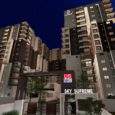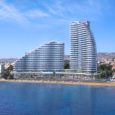Middle East investment : Dubai’s high-end properties are spearheading market averages with prices having increased during the first three months of 2016, according to a report by Knight Frank. The residential and commercial property consultancy said prices in the prime segment increased two percent on a quarterly basis, between Q4 2015 and Q1 2016.
Zarah Evans, Managing Partner of Dubai-based Exclusive Links real estate brokers, believes that as the country’s economy continues to improve, so too will foreign investment: “Despite the geopolitical unrest, Dubai is still considered as a safe haven. Property prices are reaching their lowest, mortgages rates are at their lowest and there remains the tax free advantages”.

Middle East investment
“Foreign investment has always dominated the market here whilst local residents who have lived the highs and lows of the Dubai property market are, at times, more cautious.”
The surge in the market was an unexpected result after the economy hit its slowest pace in five years earlier this year. Real estate and construction account for 21 percent of GDP, according to Dubai Department of Economic Development, and data from Dubai Real Estate Tracker showed that buyer inquiries and transactions fell in the last three months of 2015. However, foreign investment in the market could have been what has saved the country’s real estate revenue this year.

Middle East investment
According to real estate consultancy Cluttons, Dubai, Abu Dhabi and Sharjah have emerged as the region’s most popular investment destinations among GCC high net worth individuals. Cluttons’ 2016 Middle East Private Capital Survey – in partnership with YouGov – showed 27 percent of those surveyed identified Dubai in their top three destinations within the GCC, while 21 percent selected Abu Dhabi and eight percent chose Sharjah – making Dubai the most preferred location in the Middle East.
Data collected by the Dubai Land Department shows GCC nationals were the largest investors in Dubai real estate in 2015, with a total of 44bn dirhams ($11.9bn) invested or committed over the course of the year.

Middle East investment
Specific locations named within the survey, popular for foreign residential investment, include The Springs, Bur Dubai, Deira, Jumeirah Islands and Jumeirah Village. For the office asset class, Deira, Downtown Dubai, Bur Dubai and Buiness Bay were most popular.
British citizens are the second largest investors in Dubai real estate after investing £1.9bn ($2.6bn) in 2015, suggesting UK investor demand for high quality real estate is increasing. Dubai’s property market is made up of world-class infrastructure and a regulatory environment that ranks among the most favorable in the world.
The increase in British investment is in light of the Dubai Property Show 2016 (DPS), held in London, which has established itself as a solid platform for UAE based developers to present their latest project in line with Dubai’s vision 2020 to become a tourism and business hub.
Trade shows such as DPS have proven effective in the past in driving foreign investment as they “create huge opportunities for real estate developers” and “reach out to one of Dubai’s realty customer base.”

Middle East investment
An extremely attractive component of the market is Dubai’s rental yields – which are averaging just over seven percent, compared to cities such as Hong Kong, which average around two to three percent, and London at three to four percent. In some parts of Dubai, such as The Palm Jumeirah in the Dukes and Anantara project developments, the yield can be as high as 10 percent.
The reason behind the country’s growing yields is due to a robust rental market and an increase in job creation; renting continues to be a first choice for residents, as a quick and easy option compared to buying.
The country is in need of a boost in one of its leading sectors, considering its turbulent economy over the previous five years. Dubai experienced a formidable debt crunch in 2009, after borrowing billions from neighboring countries such as Abu Dhabi, which resulted in a freezing of $26bn debt owed by one of its largest government-related entities, Dubai World.
When it finally began to rebuild its economy last year, it was hit by the sharp fall in international oil prices. Although Dubai itself has little crude of its own, it heavily depends on the economic activity created by oil markets in Abu Dhabi, Saudi Arabia, Qatar and Kuwait. These leading countries for oil production also suffered following the drop in oil prices, which affected trade with Dubai.

Middle East investment
In order to ensure it doesn’t find itself in the same economic position as 2009, Dubai will need to trust in its property market – driven by foreign investment – as it quickly progresses and drives sectors such as tourism, hospitality and retail.
However, depending entirely on the property market leaves the industry under a lot of pressure. Other leading sectors including banking, insurance, business and industrial consulting, information and communications technology, should also be taken into account when monitoring the country’s GDP.
Ultimately, the growth of the property market interrelates with other sectors within the country’s economy. Dubai has a tourism infrastructure that can support both an expat style of living and business employees wanting to reside in the area, which is not an attraction other UAE countries can offer.

Middle East investment
Call +91 – 9845017139 / +91 – 9845044734 / + 91 – 9845064533 / 080 – 42110 448 / 080 – 42124147 / 080 – 49598502 to Know more about buying Property in Dubai
Book mark our Website to get latest Updates, http://propheadlines.com, Stay in touch in our Face book page https://www.facebook.com/propheadlines/




